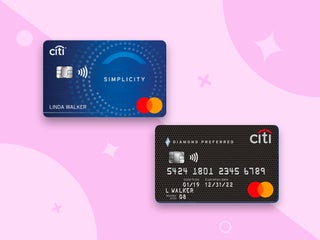Summary
Personal loans and credit cards require you to borrow money that must be paid back, but the way they’re set up and the perks they offer work better for some than for others. Read on to find out which might work better for your goals.
The content on this page is accurate as of the posting date; however, some of our partner offers may have expired. Please review our list of best credit cards, or use our CardMatch™ tool to find cards matched to your needs.
Avoiding debt is a noble goal, but it’s not always a realistic one.
There are times when you just have to borrow money to stay afloat or to pay for a long-term goal you’re struggling to save for.
Not only that, but life happens – and other bills never seem to stop rolling in. For those reasons and plenty of others, it’s not uncommon for consumers to borrow money via a credit card or even a personal loan.
But which option is better? That really depends on your goals and who you ask. Both personal loans and credit cards require you to borrow money that you have to pay back, but the way they’re set up and the perks they offer work better for some than for others.
The biggest difference between a personal loan and a credit card
Personal loans have become all the rage these days, mostly due to obsessive marketing efforts from the online lenders and banks that offer them. In short, the main difference between them and credit cards is that you get the loan funds in a lump sum, so you can’t keep using a personal loan over and over to borrow more as you can with plastic.
Still, these loans can be better than other options if you need to borrow money. Not only do personal loans come with fixed interest rates and fixed repayment periods, they also come with a fixed monthly payment that will never change. Keep reading to learn how personal loans work. Then, find out other ways personal loans differ from credit cards:
How do personal loans work?
How do personal loans work in real life? With a loan from a lender like SoFi, for example, you can borrow up to $100,000 with a fixed monthly payment, a fixed repayment timeline and a fixed APR between 5.99% and 21.20% with autopay.
If you wanted to take out a personal loan to consolidate $10,000 in credit card debt and you had excellent credit, you might consolidate that debt onto a new personal loan with a 5.99% APR. In that case, you might choose a personal loan with a five-year term and a monthly payment of $193 during that time.
With this example, you would know exactly how much you would pay each month ($193) and exactly how long you would pay it (60 months). Your interest rate would also never change, which means a personal loan is downright predictable.
A personal loan can limit how much debt you’ll get into
According to financial coach Steven Donovan, the fact that money is more about psychology than your financial knowledge can work in your favor if you take out a personal loan. “A personal loan will limit the consumer’s chances of getting into more debt since the personal loan is not a revolving loan like a credit card,” he says.
Not only do credit cards come with variable interest rates, but the fact that they’re a revolving line of credit and you can continue using them for purchases means that your monthly payment can change, too.
A personal loan will give you a fixed repayment schedule
College professor and financial planner Brandon Renfro says another benefit of personal loans is the fixed repayment term that helps consumers know exactly when they’ll be debt-free – and that this is also a major downside of credit cards.
“With a credit card you could cut back to paying only the minimum,” he said. “That could help you in a pinch, but you’d want to get back to a point where you could pay more than the minimum quickly.”
If you have good credit, you might qualify for a much lower interest rate
A final difference between personal loans and credit cards is that, if you have good credit, you can typically qualify for a much lower interest rate. While the average APR for credit cards is currently around 16%, you can frequently find personal loans with APRs as low as 5.99%.
When you should use a personal loan
For the most part, experts agree that personal loans are best for people who may need more time to pay down their balances. You’ll get a low fixed rate that can last for several years – and the security of a fixed monthly payment that will never change.
Another plus is that you can’t carry around a personal loan in your wallet and use it to rack up more debt. With that in mind, a personal loan can be a better choice if you need to borrow a specific amount of money, but you’re worried that using a credit card might entice you to spend more.
When you should use a credit card
While credit cards come with higher variable APRs, they offer more flexibility and a handful of benefits that can make them a good deal. For starters, credit cards let you borrow only what you need, meaning they don’t require that you commit to borrowing a lump sum.
According to author and financial attorney Leslie Tayne, this is why credit cards are often the better choice when you need to make smaller purchases and pay them off relatively quickly. When you have the opportunity to charge purchases as you go, you may wind up borrowing less. Here are some other instances in which you might want to use a credit card instead of a personal loan:
Use your card to earn rewards
Many consumers also use their credit cards for their everyday purchases to earn rewards. This strategy can leave you ahead each month if you consistently pay off your balance in full. Some credit cards even offer big sign-up bonuses if you spend $500 or more within a certain number of months, which is easy to do with just regular spending and bills.
“This can be a good system if you’re making a consistent habit of paying your balance off completely,” Tayne says.
She also noted that credit cards can offer additional security like extended warranties and purchase protection, which can help protect your investment when you buy items that qualify for this coverage.
Use a card with a great intro APR offer
Some cards also offer lower initial rates that can make applying for one worth it when compared to the rate you might get on a personal loan, says Renfro. He’s talking about cards with 0% APR offers for anywhere from 12 to 18 months on purchases or balance transfers.
With a card that gives you 0% APR on purchases for a year or more, you could potentially borrow the money you need to make a large purchase, then slowly pay it off without interest over time.
Just remember that, like all good things, 0% APR offers come to an end. If you don’t pay your balances off before your introductory offer is up, you’ll watch as your interest rate resets to a much higher variable APR.
And either way, it’s important to beware of the pitfalls of using credit, the biggest of which is the potential to rack up debt you can’t just pay off. It’s tempting to spend with credit when you won’t get the bill for several weeks but carrying a balance can leave you paying a high APR with very little in rewards to show for it.
Bottom line
Whether you’re leaning toward a credit card or a personal loan, just remember that the same pitfalls apply. You can borrow more money than you need with either product and both can lead to major damage to your credit score if you stop making payments for any reason.
Think long and hard about how much you want to borrow, how much time you need to pay it off and the monthly payment you can afford before you commit to any loan or line of credit. Then and only then can you borrow money with minimal risk of your new debt inflicting harm on your other financial goals. Also, leave plenty of wiggle room in your budget even after accounting for repayment of your new debt – remember, life happens.
Editorial Disclaimer
The editorial content on this page is based solely on the objective assessment of our writers and is not driven by advertising dollars. It has not been provided or commissioned by the credit card issuers. However, we may receive compensation when you click on links to products from our partners.





